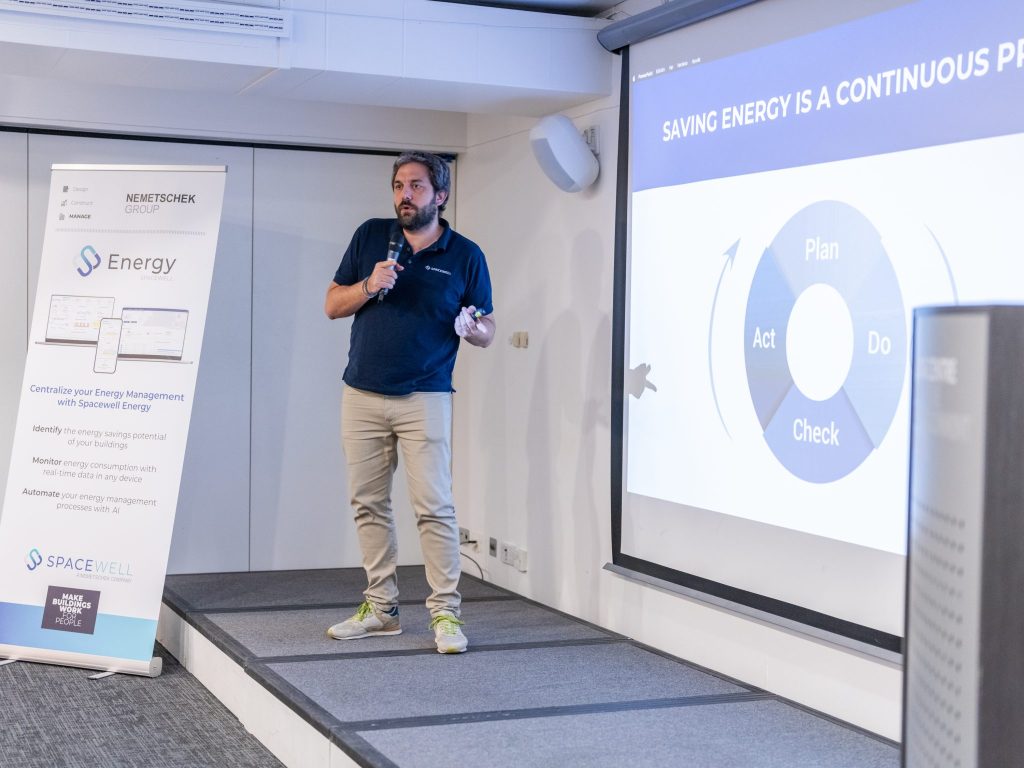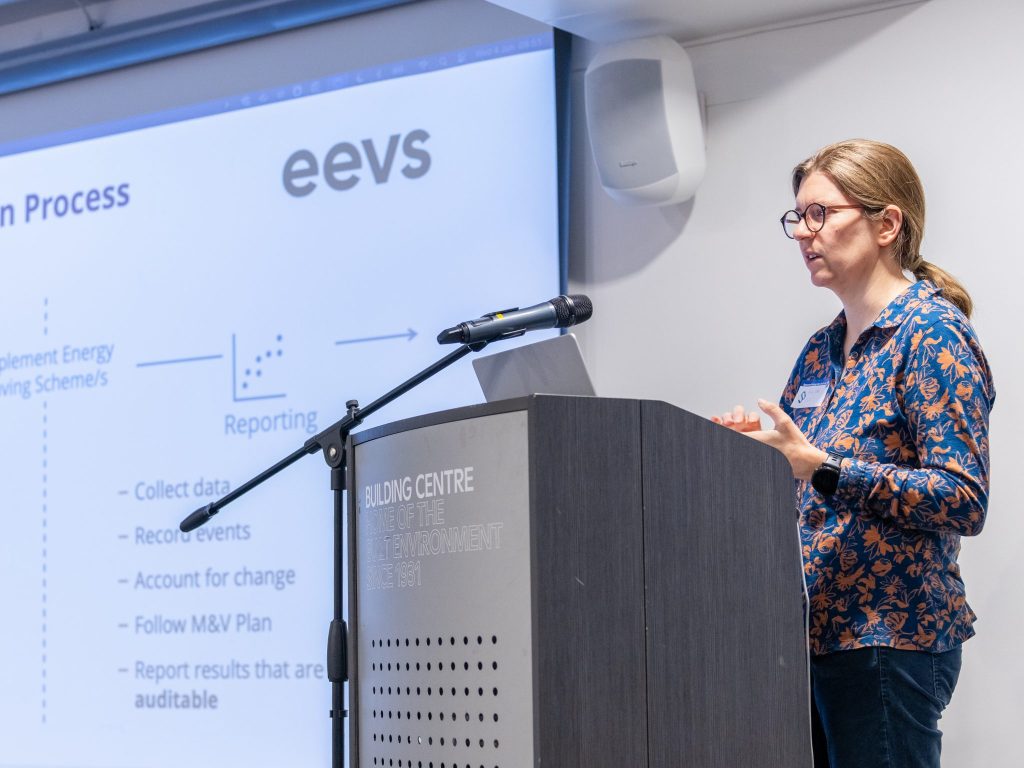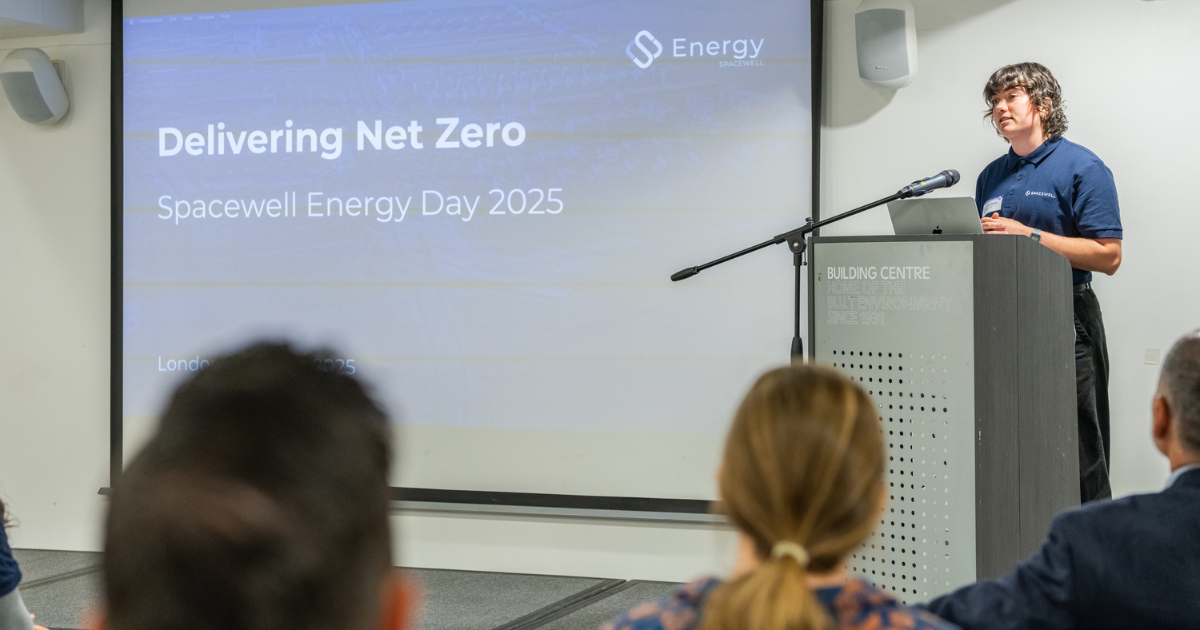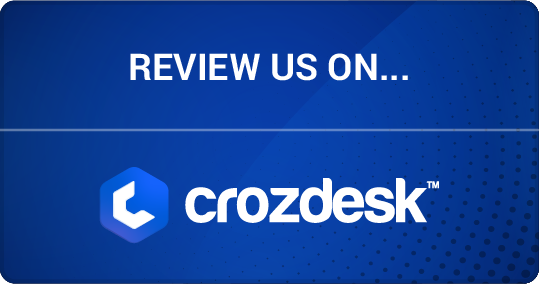On June 4th, Spacewell Energy hosted its first UK edition of Energy Day at The Building Centre in London. After more than ten successful editions in Spain, it was time to bring the conversation to the UK.
We discussed how organizations across all sectors are responding to rising energy costs and evolving regulations and how tools like energy monitoring, analytics, and Measurement & Verification (M&V) are becoming essential to drive real impact and protect savings.
The State of Energy Management in the UK
Looking into the UK market, most sectors share some challenges but there are some specific pain points:
Education
Rising energy costs, aging infrastructure and reduced Government support are affecting the Education sector the most.
Finance
Balancing decarbonization, regulatory requests for transparency and financing the energy transition bring pressure into financial institutions.
Business Services
Price volatility, the growing energy demand to meet electrification and automation demands and the high capital costs are barriers to efficiency.
Hospitality
Gaps on knowledge and resources, operational pressures and unclear Government support with regards to energy savings makes it difficult for hospitality to move forward.
Retail
The energy costs of physical stores in competition with online retailers continue to grow, along with sustainability pressures, but progress is slow due to cost and operational challenges.
Hospitals & Healthcare
Constant and rising energy demand, aging infrastructure and funding constraints are the key energy challenges for healthcare.
From these sector specific challenges and combined with our expertise and discussions during the Energy Day UK, here are the common challenges:
- Regulatory and market pressure to decarbonize is accelerating, but progress towards Net Zero is uneven due to costs and lack of expertise.
- Rising and volatile energy costs impact profitability and service delivery. Measuring & Verification of energy savings is key to demonstrate the real impact of energy efficiency measures.
- Knowledge gaps make energy strategies hard to implement, especially for SMEs and the public sector. Keeping up with digital evolution is not always easy.
- Access to capital for energy efficiency and renewable upgrades is still a challenge, despite some Government initiatives.
- Older buildings are a common barrier to energy efficiency in education, healthcare, retail and hospitality.
These challenges are shaping investment decisions, operational strategies and policy advocacy across the UK’s key industries as they seek to balance cost, carbon and resilience in a rapidly evolving energy landscape.
During Energy Day, we discussed the need for effective energy management to address all these challenges and ensure a successful strategy. The topics that sparked the most interest include:
- Energy analytics and dashboards, turning complex data into clear, actionable insights
- Savings Verification with M&V, as a key enabler of trust and accountability in energy initiatives
- AI-driven anomaly detection, helping prevent energy waste before it escalates
Energy Analytics: A Continuous Process
Energy management is not about isolated projects or quick wins — it’s a continuous process. A process that requires visibility, consistency and the ability to adapt in real time.

Setting the foundations right is essential, of course. And it will make things smoother in the future. These include setting up consumption meters and processes, selecting a team, an energy management solution, etc.
And once that is in place, you will be able to identify savings opportunities and energy consumption that you would like to reduce. And here’s where the process becomes a cycle. You’ll set up your dashboards and reports to monitor and analyse, then implement measures and monitor again to evaluate if the measures were successful, because you need to protect your savings in real time to guarantee a good ROI.
Savings Verification: From Promises to Proof
Our guest speaker Hilary Wood, Director at the independent Measurement & Verification institution EEVS, highlighted how measurement and verification can shift energy efficiency from a hopeful intention to a proven result.

As we’ve seen that Energy Savings and Net Zero Goals become more prominent, achieving savings and being able to demonstrate them are a priority for many business leaders today. Organizations today don’t just want to save energy—they want to show it. Whether it’s internal buy-in, investor assurance, or regulatory compliance, being able to track and verify results is fast becoming a competitive advantage.
An Energy Management System which aligns with international standards such as IPMVP offers this clarity. You can add real numbers to your savings and achieve results, like Iberostar Hotels have done, achieving 16% energy savings across several hotels. Or like the DoubleTree Hotel in Dartford, which saved an impressive £376,911 in a year. And in Higher Education, the UPC in Barcelona has achieved 25% energy savings as part of their energy efficiency programme.
AI in Energy Management: Automation is Here to Help
We couldn’t talk about efficiency without mentioning AI. The use of AI for Energy Management is justified whenever it brings better results than manual or traditional calculations.
This is the case in the following situations:
- Generating baselines for M&V, reducing hours of manual work to seconds
- Forecasting of energy consumption and photovoltaic generation with daily updates
- Detecting anomalies of energy consumption, identifying your patterns and alerting you of deviations
- Advanced benchmarking, to understand your savings potential and improve data quality across buildings
These examples highlighted how AI is accelerating decision-making, scaling operational impact and transforming energy management into a more proactive and strategic process.
Looking at the future, AI will become more present in energy management to help you save time in data gathering and calculations, allowing you to focus on problem-solving.

Key Takeaways
The challenges raised at Energy Day London reflect the complex, fast-changing landscape UK organizations now operate in. But they also point toward a solution: ongoing, intelligent energy management.
Whether you’re managing a school, a hospital, a bank portfolio, or a hotel chain, the ability to visualise, verify and act on your energy data is crucial.
Achieving Net Zero requires more than new tech or hardware. It demands a mindset shift: viewing energy management as a living process, measurable, trackable and continuously optimised.










